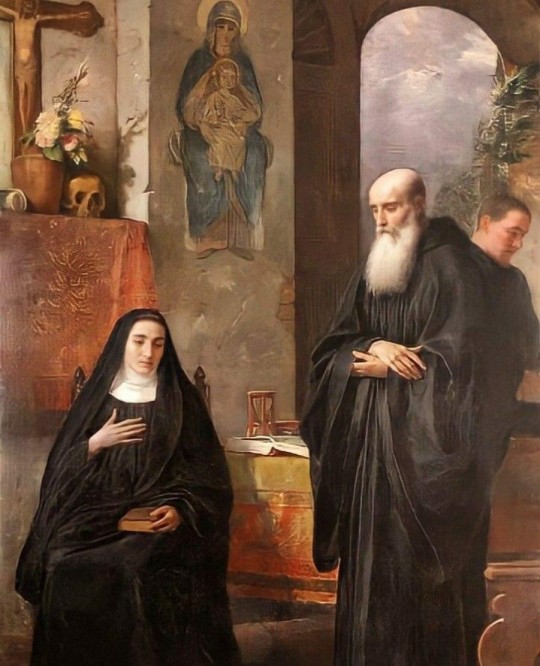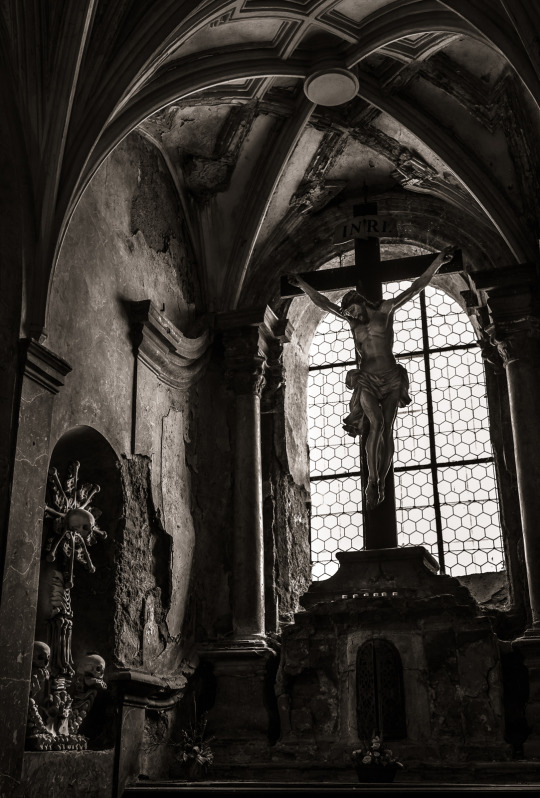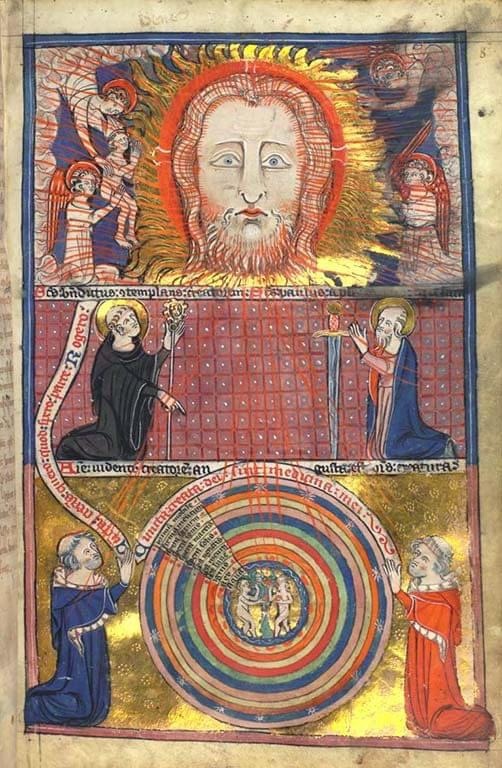#st. benedict
Explore tagged Tumblr posts
Text

Illustration depicting St. Benedict's meeting with Totila, King of the Goths, from a 1444 manuscript in the collection of Schottenstift (Vienna).
Scanned from a greeting card.
26 notes
·
View notes
Text

St. Scholastica and St. Benedict, pray for us. +
#catholic#catholicism#christianity#spiritual warfare#jesus christ#blessed virgin mary#our lady#exorcist#demon#st. benedict#st. scholastica#benedictine#nuns#monks#monastery#roman catholic church#roman catholic#mystic saint#catholic saints#catholic art#jesus i trust in you#traditional catholic#saints#the church of jesus christ
36 notes
·
View notes
Text
My pocket altar 🫶
outside ------------------------- inside


--------------- contents ---------------

Outside - I have 7 flower charms which symbolize the Seven Sorrows of Mary.
Inside - I have a few little things I collaged together that I have found out and about or that someone has given me! I definitely have a junk-journaling style approach to pocket shrines haha. I also have some quartz + angel & flower charms + a butterfly🦋 charm that symbolizes the resurrection of Christ.
Contents - I have some drawings I did that bring me peace & joy that I fold up and tuck behind the quartz 😚; One that compares the 7-pointed Fae Star with the Immaculate Heart (Seven Swords), and another of Our Lady of Lourdes. I have a St. Benedict rosary bracelet (one of two I received from my aunt when my father passed) that reminds me of my desire to improve myself/the world. And a necklace that I've been wearing basically everyday, but I keep it in here when I shower or sleep. On this necklace I have a charm for each of my babies; A Leo ♌️ charm for our Rosalina who we lost a few years ago, and a Capricorn ♑️ charm for Tadhg who we lost this past year. Today was my due date for our sweet baby boy but I miscarried a few months ago. I also have a green agate charm (connection with nature) my mother gave me, and a Fae Star charm my aunt gave me this past Christmas🎄🤶🏻!
#tw child loss#Immaculate Heart#Our Lady of Lourdes#St. Benedict#scripture#christblr#catholic#astrology#pocket altar#pocket shrine#fae star#christian witch#catholic witchcraft
19 notes
·
View notes
Text
“To pray for one's enemies in the love of Christ; to make peace with one's adversary before sundown.”
-St. Benedict
3 notes
·
View notes
Text

Source of picture: https://pierangelis.tumblr.com
"Lord my God, I called to you for help, and you healed me." Psalm 30:2
#Lord#my God#I called to you#quotes#St. Benedict#Psalm 30:2#God#Jesus#Christ#Jesus Christ#Father#Son#Holy Spirit#Holy Trinity#christian religion#faith#hope#love#stress reliever
92 notes
·
View notes
Text

Jesus I Trust in You!
We found these at the estate sale of a local veteran. They were on a paracord, and I wonder if these weren't the medals he wore in combat. I almost hate to split them up and can't help but wonder what he would have wanted.
The medals are in the tags.
#the gallery obscura#guardian angel#german crucifix#greek and latin names of christ medal#st. michael#st. benedict#immaculate heart of mary#san damiano cross#our lady of Lourdes#st. hubert#divine mercy#4 way cross#st. jude#st. joan of arc#saint medal#holy medal#catholic imagery#catholic church#catholicism#catholic#religious imagery#religious art#religion#local artwork#local artisans#local artist#shop local#artist#artists on tumblr
10 notes
·
View notes
Text
SAINT OF THE DAY (February 10)

On February 10, the Catholic Church remembers St. Scholastica, a nun who was the twin sister of St. Benedict, the "Father of Monasticism" in Western Europe.
The siblings were born around 480 to a Roman noble family in Nursia, Italy.
Scholastica seems to have devoted herself to God from her earliest youth, as the account of Benedict's life by Pope Gregory the Great mentions that his sister was "dedicated from her infancy to Our Lord."
The twins' mother died at their birth. When Benedict was old enough, he left home to study in Rome, leaving Scholastica with her father to tend the Nursian estate.
In time, Benedict left his studies to live first as a hermit and then as the head of a community of monks in Italy.
When Scholastica learned of her brother's total dedication to the Lord, she was determined to follow his example.
It is not certain that she became a nun immediately, but it is generally supposed that she lived for some time in a community of pious virgins.
Some biographers believe she eventually founded a monastery of nuns there.
The brother and sister communities were about five miles apart. St. Benedict seems to have directed his sister and her nuns, most likely in the practice of the same rule by which his own monks lived.
Unlike her brother, St. Scholastica was never the subject of a formal biography.
As such, little is known of her life apart from her commitment to religious life which paralleled that of her brother.
Pope Gregory wrote that Scholastica used to come once a year to visit Benedict at a house situated halfway between the two communities.
St. Benedict's biographer recounted a story, which is frequently told about the last such visit between the siblings.
They passed the time as usual in prayer and pious conversation — after which Scholastica begged her brother to remain for the night, but he refused.
She then joined her hands together, laid them on the table, and bowed her head upon them in supplication to God.
When she lifted her head from the table, immediately there arose such a storm that neither Benedict nor his fellow monks could leave.
"Seeing that he could not return to his abbey because of such thunder and lightning and great abundance of rain," Pope Gregory wrote, "the man of God became sad and began to complain to his sister, saying, 'God forgive you, what have you done?'"
"'I wanted you to stay, and you wouldn't listen,' she answered.
'I have asked our good Lord, and He graciously granted my request, so if you can still depart, in God's name return to your monastery, and leave me here alone.'"
St. Benedict had no choice but to stay and speak to his sister all night long about spiritual matters — including the kingdom of heaven for which she would soon depart.
Three days later, in the year 543, Benedict saw the soul of his sister in a vision, departed from her body, and in the likeness of a dove, ascend into heaven.
He rejoiced with hymns and praise, giving thanks to God. His monks brought her body to his monastery and buried it in the grave that he had provided for himself.
St. Benedict followed her soon after and was buried in the same grave with his sister.
2 notes
·
View notes
Text
What are you giving up for Lent?

(for someone who’s focused on the wrong thing)
What are you giving up for Lent?
It’s the classic question as we start Lent.
No matter how we answer it, if our answer feels negative? That means we’ve probably gotten it wrong.
Because when it feels that way, either we’re giving up something that means little to us. We’re following the form of Lent but we’ve lost the substance. We’re just checking another box. And that’s it.
Or we’ve gone too far into the substance - and lost the spirit. Turning it into something that feels more like an off-target version of St. Benedict’s famous advice on Lent – “Renounce yourself in order to follow Christ.”
With the renunciation – the giving-up-for-Lent part – being the focus.
If that’s our understanding of St. Benedict – if we’re giving up something for the sake of giving up something – then we’ve missed the point he’s making.
The renunciations of Lent are never their own end. They are merely a means. A means to something much greater – dumping the things that have come between us and God.
While they may be the spiritual equivalent of filling potholes on our road to God, the renunciations of Lent are not optional.
Not because God’s going to punish you if you don’t give something up for Lent.
But because the right renunciations – dumping the things that have come between you and God – prepares you to receive the good that God wants to do in your life this Lent.
Instead of asking what you’re giving up for Lent, maybe a better question is why?
Today’s Readings
#Lent#Giving Up for Lent#Dumping#Potholes#Getting between you and God#St. Benedict#God#Jesus#Catholic#Christian#Church#Moments Before Mass
16 notes
·
View notes
Text
The Instruments of Good Works
Instructions from St. Benedict on living an upright life:
To love the Lord God with one's whole heart, one's whole soul, and one's whole strength.
To love one's neighbor as oneself.
Then not to murder.
Not to commit adultery.
Not to steal.
Not to covet.
Not to bear false witness.
To respect all men.
And not to do to another what one would not have done to oneself.
To deny oneself in order to follow Christ.
To chastise the body.
Not to become attached to pleasures.
To love fasting.
To relieve the poor.
To clothe the naked.
To visit the sick.
To bury the dead.
To help in trouble.
To console the sorrowing.
To become a stranger to the world’s ways.
To prefer nothing to the love of Christ.
Not to give way to anger.
Not to nurse a grudge.
Not to entertain deceit in one’s heart.
Not to give a false peace.
Not to forsake charity.
Not to swear, for fear of perjuring oneself.
To utter truth from heart and mouth.
Not to return evil for evil.
To do no wrong to anyone, and to bear patiently wrongs done to oneself.
To love one’s enemies.
Not to curse those who curse us, but rather to bless them.
To bear persecution for justice’ sake.
Not to be proud.
Not addicted to wine.
Not a great eater.
Not drowsy.
Not lazy.
Not a grumbler.
Not a detractor.
To put one’s hope in God.
To attribute to God, and not to self, whatever good one sees in oneself.
But to recognize always that the evil is one’s own doing, and to impute it to oneself.
To fear the Day of Judgment.
To be in dread of hell.
To desire eternal life with all the passion of the spirit.
To keep death daily before one’s eyes.
To keep constant guard over the actions of one’s life.
To know for certain that God sees one everywhere.
When evil thoughts come into one’s heart, to dash them against Christ immediately.
And to manifest them to one’s spiritual father.
To guard one’s tongue against evil and depraved speech.
Not to love much talking.
Not to speak useless words or words that move to laughter.
Not to love much or boisterous laughter.
To listen willingly to holy reading.
To devote oneself frequently to prayer.
Daily in one’s prayers, with tears and sighs, to confess one’s past sins to God, and to amend them for the future.
Not to fulfill the desires of the flesh; to hate one’s own will.
To obey in all things the commands of the Abbot, even though he himself (which God forbid) should act otherwise, mindful of the Lord’s precept, “Do what they say, but not what they do.”
Not to wish to be called holy before one is holy; but first to be holy, that one may be truly so called.
To fulfill God’s commandments daily in one’s deeds.
To love chastity.
To hate no one.
Not to be jealous, not to harbor envy.
Not to love contention.
To beware of haughtiness.
And to respect the seniors.
To love the juniors.
To pray for one’s enemies in the love of Christ.
To make peace with one’s adversary before the sun sets.
And never to despair of God’s mercy.
5 notes
·
View notes
Text
The Monk Who Shattered Evil
Picture this: A serene monastery nestled in the Italian countryside. A humble monk raises a cup of wine to his lips, unaware that it’s laced with deadly poison. As he makes the sign of the cross, the cup shatters, spilling its treacherous contents onto the ground. This isn’t a scene from a Hollywood thriller—it’s one of the many legendary tales surrounding St. Benedict of Nursia, the patron…

View On WordPress
#exorcisms#italian monk#saint benedict#St. benedict#st. benedict medal#st. benedict of nursia#the rule of st. benedict
2 notes
·
View notes
Text

Helios becomes Apollo becomes God. The Visions of God formed by St Benedict and St Paul, from: Devotional and Philosophical Writings, folio 85. Manuscript: London c. 1325-1335. University Library, Glasgow, Scotland, MS Hunter 231 (U.3.4) [Robert Scott Horton]
* * * *
“There is the inner life, which is the world of final reality, the world of memory, emotion, imagination, intelligence, and natural common sense, and which goes on all the time, consciously or unconsciously like the heartbeat. There is also the thinking process by which we break into the inner life and capture answers and evidence to support the answers out of it. That process of raid, or persuasion or ambush, or dogged hunting, or surrender, is the kind of thinking we have to learn, and if we do not somehow learn it, then our minds lie in us like the fish in the pond of man who cannot fish.”
- Ted Hughes [via “Alive On All Channels” Archive]
#Helios#the gods#God#St. Benedict#St. Paul#Robert Scott Horton#Ted Hughes#Alive On All Channels#quotes#the inner#words and writing#my favorites
9 notes
·
View notes
Text

𝘞𝘦𝘢𝘳 𝘵𝘩𝘦 𝘚𝘵. 𝘉𝘦𝘯𝘦𝘥𝘪𝘤𝘵 𝘮𝘦𝘥𝘢𝘭.
#jesus#catholic#my remnant army#jesus christ#virgin mary#faithoverfear#saints#jesusisgod#endtimes#artwork#Jesus is coming#st. benedict#pray for us#St. Benedict medal
12 notes
·
View notes
Text

Saint Benedict, Saint Michael the Archangel, and Our Lady of Holy Protection, the Immaculate Conception, bless and protect me, this web page, and those who read this prayer. Amen +
#catholic#catholicism#christianity#spiritual warfare#jesus christ#blessed virgin mary#our lady#exorcist#demon#blessed mother mary#blessed mother#blessing#st. benedict#st. michael the archangel#our lady of fatima#our lord and savior#our lord#our lady of sorrows#our lady of holy protection#immaculate conception#our lady of the immaculate heart
11 notes
·
View notes
Text
“Renounce yourself in order to follow Christ; discipline your body; do not pamper yourself, but love fasting.”
- St. Benedict
8 notes
·
View notes
Text
“And never to despair of God's mercy.”
-St. Benedict
2 notes
·
View notes




